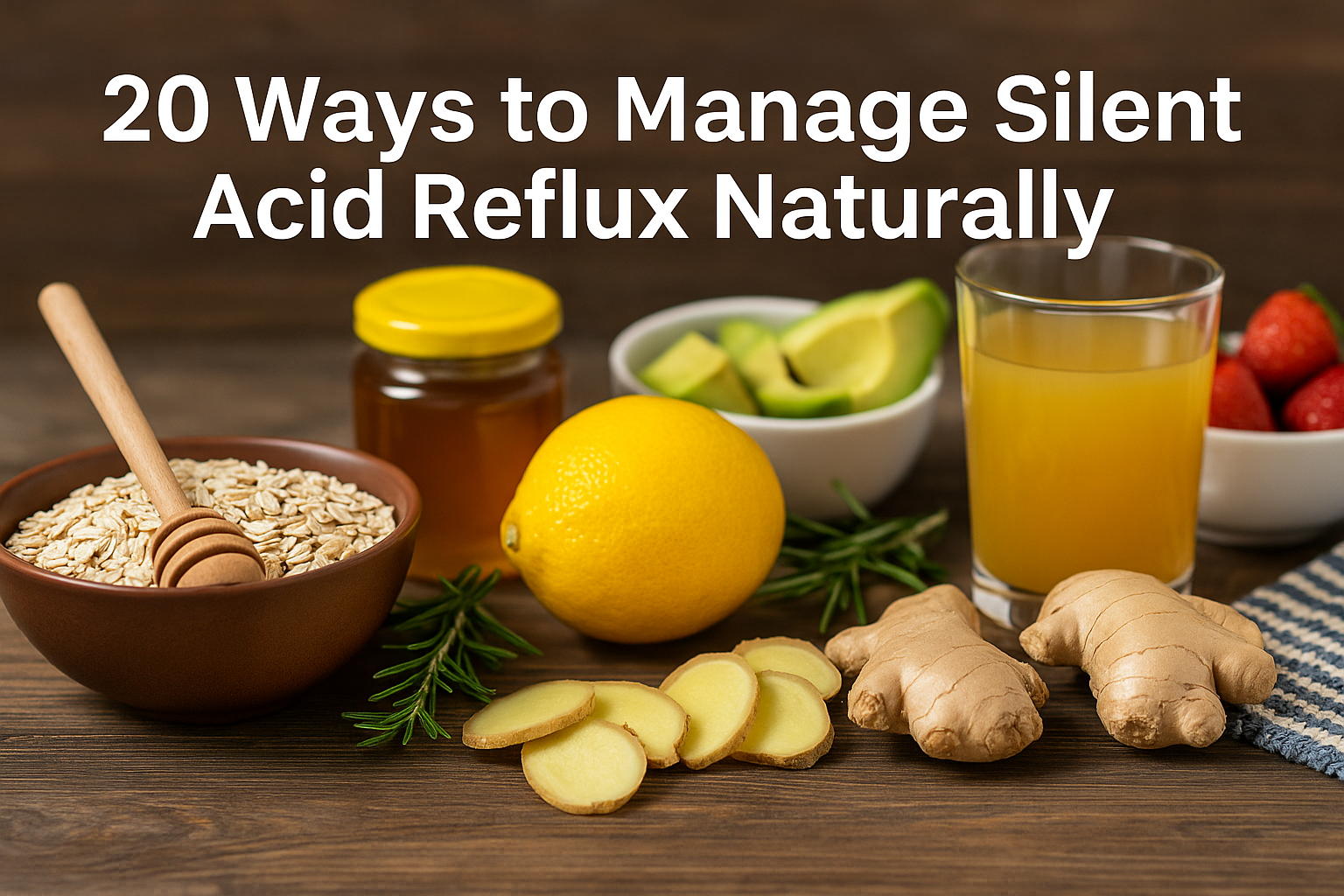
Silent acid reflux, medically known as laryngopharyngeal reflux (LPR), is an underdiagnosed condition that differs significantly from classic GERD (gastroesophageal reflux disease). Instead of heartburn, it presents with symptoms such as hoarseness, chronic throat clearing, postnasal drip, coughing, or a sensation of something stuck in the throat. Unlike typical reflux, which damages the lower esophagus, LPR affects the upper respiratory tract and vocal cords.
Because silent reflux often goes unnoticed or misdiagnosed, many sufferers fail to seek proper treatment. The good news? You can significantly reduce your symptoms—and potentially reverse the condition—using natural lifestyle and dietary interventions. This comprehensive guide provides 20 evidence-based ways to naturally manage silent acid reflux in 2025.
💡 What Is the Best Way to Manage Silent Acid Reflux Naturally?
Managing silent acid reflux naturally involves avoiding trigger foods, following an anti-inflammatory diet, improving posture and sleep habits, using herbal remedies, and managing stress. These holistic approaches support long-term healing without medication dependency.
Who Should Read This Article?
This guide is ideal for:
- Adults aged 25–65 with chronic throat symptoms or unexplained hoarseness
- Singers, public speakers, and teachers experiencing vocal fatigue
- Individuals experiencing unexplained cough, mucus, or throat irritation
- Wellness-minded people seeking alternatives to long-term acid suppression drugs
Understanding Silent Acid Reflux (LPR)
Silent reflux occurs when acid or pepsin travels beyond the esophagus and into the throat, sinuses, vocal cords, or airways. Since LPR doesn’t always cause heartburn, it’s commonly mistaken for allergies, asthma, or chronic sinusitis.
Key Symptoms Include:
- Chronic throat clearing
- Persistent cough
- Postnasal drip
- Lump-in-throat sensation (globus)
- Sore throat or hoarseness, especially in the morning
- Difficulty swallowing
- Sour taste in mouth
- Voice fatigue after speaking
Root Causes May Involve:
- Weak lower esophageal sphincter (LES)
- Poor stomach motility
- Hiatal hernia
- Poor posture and diaphragmatic pressure
- Dietary and lifestyle choices
20 Natural Ways to Manage Silent Acid Reflux
1. Follow a Low-Acid, Anti-Inflammatory Diet
Focus on whole foods like:
- Leafy greens
- Non-citrus fruits (bananas, melons, pears)
- Cooked vegetables
- Lean proteins (turkey, chicken, lentils)
Avoid acidic triggers such as tomatoes, citrus fruits, vinegar, coffee, and alcohol.
2. Avoid Carbonated Beverages
Bubbly drinks increase pressure in the stomach and promote reflux episodes.
3. Avoid Late-Night Eating
Finish your last meal at least 3 hours before bedtime to give your stomach time to empty.
4. Eat Small, Frequent Meals
Large meals increase abdominal pressure and weaken the LES.
5. Sleep on an Incline
Elevate the head of your bed by 6–8 inches or use a wedge pillow to keep acid from traveling upward.
6. Drink Alkaline Water (pH 8.8+)
Studies suggest that alkaline water may deactivate pepsin, a key enzyme in LPR damage.
7. Chew Gum After Eating
Chewing increases saliva, which helps buffer stomach acid and push it back down.
8. Stay Well Hydrated
Dehydration impairs digestion. Sip warm water throughout the day, especially between meals.
9. Avoid Tight Clothing
Tight waistbands and shapewear can increase intra-abdominal pressure, encouraging reflux.
10. Practice Diaphragmatic Breathing
Deep abdominal breathing strengthens the diaphragm and improves LES function.
11. Manage Stress Effectively
Chronic stress increases acid production and impairs digestion. Practice:
- Mindfulness meditation
- Journaling
- Tai chi or gentle yoga
12. Try Herbal Support
- Chamomile: Calms the stomach and esophagus
- Licorice root (DGL): Coats and soothes mucosa
- Marshmallow root: Anti-inflammatory and protective
- Slippery elm: Mucilage-rich and healing
13. Use Manuka Honey
Taken before bed or after meals, manuka honey can coat the throat and reduce irritation.
14. Support Digestive Enzymes
Low stomach acid or enzyme insufficiency may contribute to LPR. Consider enzyme supplements with meals under professional guidance.
15. Maintain a Healthy Weight
Excess abdominal fat increases pressure on the LES. Losing just 5–10% of body weight can yield noticeable improvements.
16. Track Triggers with a Symptom Diary
Use a digital app or notebook to log meals, beverages, symptoms, and stress levels.
17. Avoid Smoking and Secondhand Smoke
Smoke relaxes the LES and increases inflammation throughout the respiratory tract.
18. Limit Caffeine and Chocolate
Both lower LES pressure and increase reflux episodes. Switch to herbal teas or decaf options.
19. Avoid Excess Salt and Spices
Salt and chili-based dishes can provoke throat irritation in sensitive individuals.
20. Use Probiotics
Gut dysbiosis may play a role in reflux. Try probiotics like Lactobacillus plantarum or Bifidobacterium infantis.
Pro Tips from Functional Nutrition Experts
- Eat slowly and chew thoroughly. Digestion begins in the mouth.
- Add ginger tea before meals to support gastric emptying.
- Don’t drink large amounts during meals. Sip fluids between meals instead.
- Try intermittent fasting (12–14 hours overnight) to reduce gastric load.
- Wear posture-correcting devices if you spend long hours seated.
- Consult a speech-language pathologist if your voice is frequently hoarse.
Frequently Asked Questions (FAQ)
Can silent reflux be cured without medication?
In many cases, yes. A combination of diet, sleep position, herbal remedies, and stress management can reverse symptoms naturally.
Is it safe to stop PPIs (proton pump inhibitors)?
Never stop PPIs abruptly without medical supervision. Gradual tapering alongside natural strategies is best.
What foods help calm silent reflux?
Alkaline and anti-inflammatory foods like oatmeal, bananas, steamed greens, and chia seed puddings are often well tolerated.
Are dairy products bad for LPR?
Some people are sensitive to dairy, especially full-fat or processed types. Elimination trials may help determine tolerance.
What’s the difference between GERD and LPR?
GERD primarily affects the lower esophagus with symptoms like heartburn. LPR impacts the upper airway and throat, often without chest symptoms.
What Worked for You?
Have you overcome silent reflux with natural remedies?
👇 Leave a comment below to share your story or tips—it could help someone else find relief without medications.



